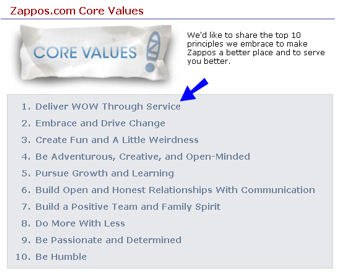On the bottom of Zappos, an online retailer, website is a random display of one of their ten core values. When you click on it, you see a full display of all ten values.
Note the number one item “Deliver WOW Through Service”. An interesting, and on its face, a laudable statement. Ah, but do they really deliver WOW customer service? Many companies boast of superior customer service. Based on a recent purchase made by my son, the answer for Zappos is a resounding Yes.
The incident involved my son entering incorrect order information. He realized this when the order was received. He contacted Zappos customer service and was told to sent the item back and they paid postage. The correct item was sent by overnight delivery at no cost.
This would have been enough, but a few days later he received a post card with a hand written note.
I knew about Zappos but I wanted to learn more. I found an interesting commentary about them on Harvard Business Publishing – Discussion Leaders (access video). In fact they have an interesting customer service approach —
This company is fanatical about great service—not just satisfying customers, but amazing them. The company promises free, four-day delivery. That’s pretty good. But most of the time it delivers next-day service, a surprise that leaves a lasting impression on customers: “You said four days, but I got them the next morning.”
Zappos has also mastered the art of telephone service—a black hole for most Internet retailers. Zappos publishes its 1-800 number on every single page of the site—and its smart and entertaining call-center employees are free to do whatever it takes to make you happy. There are no scripts, no time limits on calls, no robotic behavior
But there is more. Zappos “bribes” new employees to quit. After about one week on the job Zappo’s offers the new employee pay earned plus $1000 (USD) to quit. WHY?
Because if you’re willing to take the company up on the offer, you obviously don’t have the sense of commitment they are looking for. It’s hard to describe the level of energy in the Zappos culture—which means, by definition, it’s not for everybody. Zappos wants to learn if there’s a bad fit between what makes the organization tick and what makes individual employees tick—and it’s willing to pay to learn sooner rather than later. (About ten percent of new call-center employees take the money and run.)
Brilliant!
Ed Konczal has an MBA from New York University's Stern School of Business (with distinction). He has spent the last 10 years as an executive consultant focusing on human resources, leadership, market research, and business planning. Ed has over 10 years of top-level experience from AT&T in the areas of new ventures and business planning. He is co-author of the book "Simple Stories for Leadership Insight," published by University Press of America.



